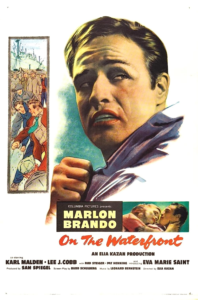The film, On the Waterfront has been called one of the greatest films ever made and has been synonymous with Marlon Brando. The film directed by Elia Kazan came during the high point of the McCarthy hearings of the 1950s. Today, many in Hollywood have a strong resentment towards Kazan over the hearings he participated in. Kazan remained successful post hearing where many film makers were not as fortunate.
The House Un-American committee (HUAC) activities started in 1938 and its mission was to draw out suspected members of the Communist party, and the committee focused their search on Hollywood. According to the Harry Truman Presidential Library, The Red Scare caused years of friction between citizens and the United States Government as the line between liberties and national security blurred. Many US citizens felt the government was overstepping on civil liberties but others were in support of the McCarthy hearings.
Elia Kazan was subpoena in January of 1952 and during his first hearing said he was a member of the party from 1934-1936 but left in 1936. At this time, he gave no names to the committee. When a person was called to testify, the committee expected them to name names. Kazan, after testifying the first time, thought his time in Hollywood was ending and feeling scared, he volunteered to testify again. He went back to the committee in April of 1952 and this time named 8 of his former friends. If anyone was deemed “an unfriendly witness” they were immediately put on a blacklist. The Hollywood blacklist destroyed many people’s lives and careers. Those who were blacklisted had to work under fake names until the mid 1960s. Kazan wasn’t the only high profiled person who spoke to the committee. Others included Walt Disney, Ronald Regan, and Jack Warner.
After naming names to the committee, Kazan took out a full page ad in the New York Times to defend his reason for telling and strongly encouraged other Americans to do the same. Kazan never acknowledged the damage he caused. Kazan’s friend and playwright Arthur Miller said that he was writing a screenplay about longshoremen on the New Jersey docks and thought Kazan would want to direct. Miller left the project after Kazan testified and their friendship never recovered. Kazan re-worked Miller’s screenplay and turned it into On the Waterfront.

The film stars Marlon Brando as Terry Malloy, a low level dock worker on the waterfront. Malloy is one of the pawns in his union leader, Johnny Friendly’s goal, to stop workers from speaking to the Waterfront Commission. In the beginning of the film Terry helps lure a fellow worker to his death after confirming to the Commission he will testify. Terry soon meets and starts a relationship with the dock worker’s sister Edie (Eve Marie Saint) and is plagued by the guilt he causes.
At the Academy Awards the movie won 8 prizes and Kazan in his biography wrote “I was tasting vengeance that night and enjoying it. `On the Waterfront’ is my own story; every day I worked on that film, I was telling the world where I stood and my critics to go and – – – – themselves”. Kazan’s critics still believe that he made On the Waterfront as a way to justify his reasonings for giving names. Film critic Jonathan Rosenbaum said he could not forgive Kazan for using the film to make himself look better. In 1982 Orson Welles was asked during an interview what he thought of Kazan. Welles responded “Elia Kazan is a traitor. He is a man who sold to McCarthy all his companions at the time, then he made On the Waterfront which was a celebration of the informer”.
For many years Kazan was not given any honorary awards due to his involvement with HUAC. The American Film Institute and the Los Angeles Film Critics Association rejected him for life achievement awards. For the Academy Award ceremony for 1999, the Oscar board decided to give Kazan an honorary Oscar for his achievements. This caused much resentment from the victims of the blacklist and had people questioning if he could be separate from his politics. Film Critic and Vice President of the LA Film Critics Association at the time, Joseph McBride said in 1998 “When you’re honoring someone’s entire career you’re honoring the totality of what he represents, and Kazan’s career, post 1952, was built on the ruin of other people’s careers”. When the ceremony aired in March 1999, actors including Ed Harris and director Stephen Spielberg did not stand when Kazan came out. Outside the Oscars, there were protesters from both sides.
Elia Kazan died in September 2003. The legacy of Kazan lives on through his body of work but for some Kazan will forever be considered a traitor for his involvement during the Red Scare. On the Waterfront remains as one of the most important films of the 20th century and it changed film acting forever. Can Kazan still be considered a great artist or is he forever intertwined with the darkest days of Hollywood?


Recent Comments